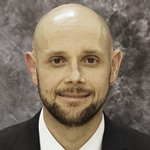Barb’s Story: '3D Mammogram Really Saved Me'
Barb Strait of Middletown considers herself one of the lucky ones. Although she endured a yearlong cancer journey, early detection and aggressive treatment made the experience easier.
A 29-year member of service sorority Phi Beta Psi, Barb is a tireless fundraiser for cancer research. She is mom to two adult daughters and wife to family physician Kevin Strait, MD. She loves to cook, do Pilates, exercise daily at the YMCA, and play golf. She also helped to take care of her 89-year-old mother.
All this nearly changed when Barb went for her annual mammogram.
“I have always been very healthy, but my grandmother died from breast cancer in the 1930s,” says Barb. And her mother had metastatic breast cancer.
When Barb scheduled her screening at Atrium Medical Center, she opted for a new 3D mammogram.
“Given my family history, I decided to do it,” she says.
The morning after her screening, she got the call. A small lump was found in her left breast. Doctors wanted another look. That led to a biopsy and a cancer diagnosis.
“It didn't register for a long time,” Barb says. “I just couldn’t believe it until I had the biopsy, and then I still didn’t believe it.”
Surgeon Daniel Butler, MD, of Roosevelt Surgical Associates, Inc., performed a lumpectomy in early December 2015. Barb’s cancer was diagnosed as HER2 positive, an aggressive form. Genetic tests for BRCA genes were negative, meaning her cancer is not hereditary and will not raise her daughters’ risk of breast cancer.
The treatment plan? Chemotherapy and radiation, combined with Herceptin, a drug used to treat HER2-positive breast cancer.
In January 2016, Barb began chemotherapy at Atrium Medical Center’s infusion center, going every Wednesday for 13 weeks. She raves about the nurses and staff.
The infusion process wasn’t bad either, until three days after treatment.
“Then I felt like I’d been hit by a bus,” Barb recalls. “Every ounce of energy I had was zapped for a day and a half. Then I'd start over again.”
Barb worried about maintaining her activities and caring for her mom. But, she says, “I made up my mind that I would not let cancer stop me from living my life.”
This kind of attitude helps patients tolerate treatments and do better, says her radiation oncologist, Ryan Steinmetz, MD of Dayton Physicians Network.
By spring, Barb was looking forward to her three-week break between chemo and radiation to put away Christmas decorations and get back to normal.
“But we had a little blip,” she says.
She received a call that her husband’s heart had stopped. He was headed to the hospital.
Dr. Strait recovered fully, but the blood pressure-related scare kept him home for four weeks, as she began radiation treatment.
“I wouldn’t do it again, but it was good for both of us,” Barb says. “We cared for each other.”
At the time, she was participating in a clinical trial testing a skin lotion to reduce irritation, itching, and burning caused by the radiation. “She is one heck of a person to go through all this and still be willing to do something to help others,” Dr. Steinmetz says.
Strait completed radiation in July, and her Herceptin infusions ended in December 2016. She is cancer-free with a good prognosis.
And she sees bright sides to her journey:
- The “army of friends and family that took good care of me. When I turned 60, I had a big thank you party. I had 65 people in my house.”
- Gaining an insider’s perspective of hospital operations. A 14-year Atrium Medical Center Foundation board member, Barb was impressed with her care. “I think it is important that people know about the 3D mammogram. It really saved me. My lump was small and might not have shown up on a regular mammogram.”
- Learning to “stop and smell the roses.” Today the Straits take time to play golf, travel, and go for nightly walks.
For all these reasons, and more, Barb feels like one of the lucky ones.


Contact Us
Call the Premier Health cancer hotline at (844) 316-HOPE(844) 316-4673 (4673), Monday through Friday, 8 a.m. to 5 p.m., for more information.

